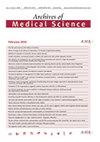COVID-19大流行期间影响护理人员睡眠障碍的选定因素评估
IF 3.3
4区 医学
Q1 MEDICINE, GENERAL & INTERNAL
引用次数: 0
摘要
睡眠障碍可能是暴露于压力源的结果。由于担心新病原体的未知性质,COVID-19大流行的爆发给医护人员带来了额外的压力。本研究的主要目的是确定影响COVID-19大流行期间工作的护理人员睡眠障碍发展的因素。材料和方法这是一项横断面、匿名、自愿的在线调查,调查对象是2020年11月10日至2021年1月14日在波兰COVID-19大流行期间工作的护理人员。该调查包括387名参与者,其中大多数是男性(72.35%)。采用专有问卷和标准化量表来确定危险因素:雅典失眠量表(AIS)和Epworth嗜睡量表。结果女性107人(27.65%),男性280人(72.35%)。在分析的量表中,女性的得分明显更高。根据AIS量表,有3.6%的女性和2.9%的男性存在轻度睡眠障碍。在紧急医疗小组(EMTs)工作的70%以上的女性和58.8%的男性被评估为过度嗜睡。结论影响睡眠障碍发生的主要因素为女性、使用助眠器和无生活伴侣。相比之下,年龄较大、工作时间较长、已婚以及与家庭成员关系良好则有保护作用。本文章由计算机程序翻译,如有差异,请以英文原文为准。
Evaluation of Selected Factors Influencing Sleep Disorders in Paramedics during the COVID-19 pandemic
Introduction Sleep disorders can develop as a result of exposure to stressors. The out-break of the COVID-19 pandemic was an additional source of stress for paramedics, due to the fear of the unknown nature of the new pathogen. The main aim of this study was to identify factors influencing the development of sleep disorders among paramedics working during the COVID-19 pandemic. Material and methods This was a cross-sectional, anonymous, voluntary, online survey conducted on social networks among paramedics working during the COVID-19 pandemic in Poland from 10/11/2020-14/01/2021. The survey included 387 participants, the majority of whom were men (72.35%). A proprietary questionnaire and standardized scales were used to identify risk factors: Athens Insomnia Scale (AIS) and Epworth Sleepiness Scale. Results Among all participants, there were 107 women (27.65%) and 280 men (72.35%). Significantly higher scores of the analyzed scales were observed in the female gender. Based on the AIS scale, mild sleep disorders were found in 3.6% of women and 2.9% of men. Excessive sleepiness on the Epworth scale was assessed in more than 70% of women and 58.8% of men working in Emergency Medical Teams (EMTs). Conclusions The main factors influencing the development of sleep disorders were female gender, use of sleep aids and not having a life partner. In contrast, older age and longer job tenure, being married, and having good relationships with family members had a protective effect.
求助全文
通过发布文献求助,成功后即可免费获取论文全文。
去求助
来源期刊

Archives of Medical Science
医学-医学:内科
CiteScore
4.90
自引率
7.90%
发文量
139
审稿时长
1.7 months
期刊介绍:
Archives of Medical Science (AMS) publishes high quality original articles and reviews of recognized scientists that deal with all scientific medicine. AMS opens the possibilities for young, capable scientists. The journal would like to give them a chance to have a publication following matter-of-fact, professional review by outstanding, famous medical scientists. Thanks to that they will have an opportunity to present their study results and/or receive useful advice about the mistakes they have made so far.
The second equally important aim is a presentation of review manuscripts of recognized scientists about the educational capacity, in order that young scientists, often at the beginning of their scientific carrier, could constantly deepen their medical knowledge and be up-to-date with current guidelines and trends in world-wide medicine. The fact that our educational articles are written by world-famous scientists determines their innovation and the highest quality.
 求助内容:
求助内容: 应助结果提醒方式:
应助结果提醒方式:


